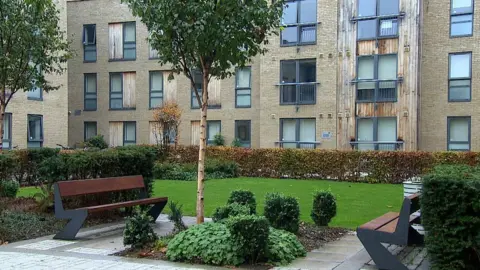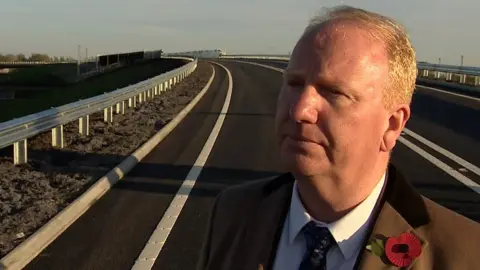Should student flats be owned by the council?
 BBC
BBCAt Brunswick House in Cambridge students can rent a large en-suite room, sharing a kitchen with five others, for £183 a week.
With more than 200 rooms, and a ready supply of potential tenants, it's an investor's dream. But the students who live there don't pay their rent to a commercial investor.
In fact, it goes to Cambridgeshire County Council, which has just bought the building for £38m.
The council is upfront about why it's bought the building - it is "an investment opportunity to fund our frontline services," says Cllr Joshua Schumann, chairman of the council's commercial and investment committee.
He says the purchase "is about us making sure that as budget pressures become more challenging, we have the money to support the most vulnerable members of our community".

And Cambridgeshire isn't alone when it comes to investing in commercial property.
Two years ago Spelthorne Council in Surrey spent £365m buying BP's headquarters. Earlier this year it spent another £170m on an office block in west London.
Meanwhile Stockport Council bought a large shopping centre in 2016 for £80m.
Across England, the amount councils have spent on acquiring land and buildings has shot up from about £1bn in 2015/16, to £4bn last year.
This year councils expect that figure to rise again, to £5bn. Much of that money will be spent acquiring commercial property, financed through cheap loans from the Public Works Loan Board.
Cambridgeshire's purchase of Brunswick House has come about through some complicated financial engineering - the council has borrowed £100m at government-backed interest rates of about 2%, well below market rates.
It has loaned that money to a company it owns called This Land. This Land is using that loan to buy council-owned land, on which it will build houses. And so the council gets the money back as a capital receipt which it uses to invest in buildings like Brunswick House.
Cllr Steve Count, the council's Conservative leader, says he's proud to lead a council that looks for "financial solutions". He points out that by using the loan in the way it is, the council gets two income streams - interest on the loan it's made to This Land, and rents from Brunswick House.
"Anybody looking at this with a financial background will understand it's not just complicated, it's actually great use of public funds," he says.
"What we are managing to do is use public funds in a multitude of different ways delivering on a multitude of objectives.
"This is a council not complicating matters but utilising funds to the very best of their ability. And we're very good at that."

But the body that regulates local authority financial managers is concerned about the scale of borrowing across England. Last month, the Chartered Institute of Public Finance and Accountancy (CIPFA) wrote to every council in England, reminding them of rules that ban them from borrowing to invest for purely commercial purposes.
Don Peebles, CIPFA's head of policy and technical, says that "by taking a disproportionate level of borrowing, councils are perhaps opening themselves up to a level of risk that has not necessarily been identified".
And he warns that because income streams from commercial property are not guaranteed, but the debt will need to be repaid, councils are opening themselves up to "a longer term risk".
The councils do, however, have their supporters.
Paul Hackett is the director of the Smith Institute, a think tank that focuses on housing, regeneration, public services and local growth. He argues commercial investments can do more than just prop up an authority's finances.
"A lot of councils in the North or Midlands are struggling to kick start things where values are not so high, where the market is not so active," he says.
"Sometimes there's nothing else to be done but for the council to take a risk and get involved. Particularly when it comes to regeneration, where many councils are frustrated that things aren't happening, maybe they feel the risk is worth the potential reward."
In Cambridgeshire, however, the reward is clear. Each student living at Brunswick House contributes six times more to the county's coffers than the average council tax payer.
